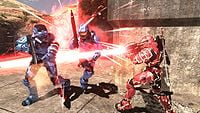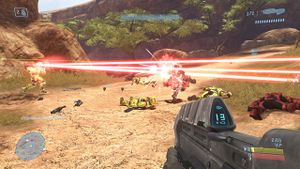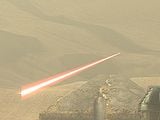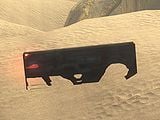Weapon/Anti-Vehicle Model 6 Grindell/Galilean Nonlinear Rifle
From Halopedia, the Halo wiki
Template:Ratings Template:Weapon
- "It's not overpowered, it's an elegant weapon from a more civilized age."
- — Luke Smith
The Weapon/Anti-Vehicle Model 6 Grindell/Galilean Nonlinear Rifle[1] (abbreviated W/AV M6 G/GNR), also known as the Spartan Laser, is the UNSC's ground-based, man-portable, anti-vehicle, directed energy weapon.
It is the only known battery-powered UNSC weapon, and is the most powerful infantry weapon fielded by UNSC forces. It is capable of penetrating multiple targets, including tanks, unlike the Sniper Rifle, which can only penetrate infantry. It is alternatively known as the Galilean, or, in player lexicon, the "Splaser".
Despite the name, the Laser can be used by regular humans, such as UNSC Marines, and ODSTs. The name could have been derived because of its weight.
Background
The M6 Spartan Laser is a man-portable, shoulder-fired, directed energy weapon used by the UNSC. When the trigger is pulled, a red targeting Laser is painted on-target accompanied by an audible whine as the weapon cycles up. The Spartan Laser will then charge for approximately three seconds before discharging the main laser. As the Spartan Laser charges, the charging tone gets noticeably louder up until the laser is fired. The firing sequence can be aborted without discharging the battery as long as the weapon is not actually fired; for example, if the target moves out of sight or the operator needs to displace. The laser is capable of penetrating several enemies or vehicles, and has a small blast radius, injuring targets within two meters of the point of impact and toppling light vehicles. It has an offline sequence between shots while it (presumably) cools down (approx. 2-4 seconds), and is highly effective at destroying enemy vehicles.[2]
In Halo 3 Multiplayer, if you kill another player with the Spartan Laser, you will receive a medal, the Laser Kill Medal. It is likely awarded due to the difficulty of having to charge and aim the weapon. Also, the achievement "Two for One" is unlocked by scoring a double kill with a single laser shot in any ranked free-for-all playlist.
The weapon is not available in the campaign until the level The Covenant, which Master Chief begins the level armed with the Spartan Laser. There is another Spartan Laser lying nearby on the ground, presumably dropped by a Marine, but only if played on Easy or Normal. The M6 is the only weapon able to harm 343 Guilty Spark on the final level of Halo 3, with the exception of the Fuel Rod Gun and Rocket Launcher, through a glitch that Bungie has removed.
The way it damages is by multiple attacks (obviously with extremely little time between them). It isn't a one-hit attack as it generally appears to be. It could also be said that the more time you're in the laser fire, the more damage it accumulates. If you're barely stroked by the laser (especially if you're in a speedy vehicle), you may survive. Evidence to this could be how you can shift the laser a bit during mid-shot (during the time the actual laser is shot).
Combat
Advantages

The Spartan Laser is the most powerful weapon in Halo 3, combining long range with a devastating attack. The weapon is classified as an anti-infantry and anti-vehicle weapon, making it a weapon that can destroy almost anything in the operator's path. All destructible vehicles are often destroyed in a single blast, except in the case of a near miss, in which case the target will still suffer heavy damage. It can also strike and kill multiple opponents and vehicles if they are lined up correctly. Also its beam travels instantly to its target making dodging impossible. It is more powerful than the rocket launcher, and since the Laser travels practically instantaneously, it can be used far more easily and reliably at range. The Spartan Laser has a 3x scope, which makes it a weapon of considerable range and accuracy. It also causes splash damage, letting the player kill more than one person per shot.
Disadvantages
As with all powerful weapons, there are a few disadvantages. The Spartan Laser needs to charge up for three seconds (four seconds after TU2) before firing and needs another two to four seconds to cool down after firing. The laser bleeds off 20% of its battery's charge per shot, giving only five shots at most. Though the scope increases its effective engagement range, it doesn't have the range to out-perform the Sniper Rifle. However, due to the laser's splash damage, it can out-perform a bad sniper. The targeting laser may also give away the operator's position. If a player sees the targeting beam, they could possibly dodge the shot, thus wasting valuable battery power, though this is very unlikely, as the targeting beam is very faint and hard to see in the midst of battle. However, it is possible to hear the laser if you are near the targeting beam no matter the distance. A point blank shot isn't recommended, as you can commit suicide through splash damage. Finally, the laser is infamous for the difficulty in aiming the weapon, being nearly impossible for inexperienced players to engage quick, erratically-moving targets.
Operation
Targeting
When the weapon is equipped, a shroud over the emitting lens of the laser lifts up to expose it, presumably to protect it from scratches and battle damage when holstered, although the weapon is shown with the shroud up when it is on a person's back. The shroud can be seen doing this when the weapon is drawn in first person view if the user looks carefully. A small hydraulic or pneumatic cylinder on the left side of the shroud actuates the shroud where it is anchored to the chassis of the weapon. When the trigger is pulled, a harmless red laser sight is projected on the target and a unique targeting tone is emitted. The Spartan Laser will then charge for four seconds[3] before firing a red laser beam that usually destroys the target. In the Halo 3 beta, if the reticule was moved while firing, a scattering of beams would be released, spreading over the targeted area. For the few frames while the laser is fired, the right targeting stick is disabled. The beam can be strafed, however, over a larger area if the player is moving while the laser is firing.
The Spartan Laser is equipped with a smart-linked Wyrd III optics suite for increased accuracy and is capable of 3x magnification. Its reticule, whether on 1x or 3x magnifications, features a meter on the right side showing the charging status of the laser.
Laser Beam
Under normal circumstances, as long as a direct impact is delivered, one laser shot will destroy any target. Wraiths and Scorpions cannot be simply shot at; each has a vulnerable point that must be hit to achieve a catastrophic kill with one shot. The Wraith must be fired upon from the rear right below the mortar or, at its power core, or directly aimed at the cockpit. The Scorpion must be hit in the driver's canopy to kill him/her instantly, though the actual tank can't be destroyed instantly; this is a good thing since you can kill the driver then keep the Scorpion for yourself although it will be heavily damaged. You can also destroy it with one shot if you aim for the main cannon on the top of the tank. It is powerful enough to make its way through nine Warthogs, but oddly, only four Mongooses parked bumper to bumper. It is also highly effective at destroying Scarab leg joints, although The Covenant is the only mission where this can be done, and it is unlikely the player will keep the Spartan Laser that long into the level without completely draining its battery. The beam is also known to have high splash damage at its impact point, and around its shot, and also has the capability to penetrate, and eliminate multiple targets aligned in a linear trajectory. If the player is facing a wall, an opponent or another obstacle at an extremely close range, the splash damage will instantly kill the operator. After firing, the weapon stops functioning for a brief period of time as it dumps its waste heat. The splash damage can be increased by strafing the reticule quickly when firing, to hit a larger area, though this is hard to achieve due to the nature of the weapon. The weapon has five shots before a "recharge" is needed.[3]
It is powered by a BA-53635/PLMD non-replaceable battery, which is recharged with a PP-16979/AM-Sh charger. UNSC logistics, however, are not sufficient for the charger to accompany many W/AV M6 G/GNR units in the field. It would be better to use the weapon when hidden as it takes a long time to charge and the enemy has a better chance of defending themselves, unless the player is not noticed by their enemy.
Trivia
- It remains unclear what exact energy is fired from the M6, while some have suggested that it fires a chemical Laser, however, not only have some disputed this, noting that a gas or chemical Laser does not produce a powerful energy output but they also require large amounts of highly volatile and toxic chemicals to function which are expended as the weapon fires. The weapon seems to be only powered by a rechargeable battery pack, hinting that it may be a Solid-State Laser or Free Electron Laser, which does not require a constant source of a chemical gain medium.
- Luke Smith's comment: "It's not overpowered, it's an elegant weapon from a more civilized age," is a reference to Star Wars Lightsabers.
- The Spartan Laser is currently the most expensive weapon to produce known. It costs 218,000.00 cR, more than the cost of four fully armed Warthogs, 134 MA5B Assault Rifles, or over 7,266 M9 Fragmentation Grenades.
- It is unclear how the W/AV M6 G/GNR was given the battlefield moniker Spartan Laser. It is possible that the first wielder of the weapon was a SPARTAN-II super-soldier. Another possible reason for the nomenclature is that Spartans are symbols of invincible death machines capable of destroying vast numbers of enemy equipment and personnel.
- The side of the weapon has the Norse symbol for "Gungnir" etched into it, which was the mythical spear wielded by the god Odin in Norse Mythology. Gungnir was described as having the ability to always hit its mark. Part of the mythology is that Odin would hurl his spear over the doomed side of a battle. This also adds to the theory of how the Spartan Laser was named because the Spartan armor is called, MJOLNIR, Thor's hammer. This is also supported by the fact that on the ONI Memorial wall there is a plaque mentioning PROJECT: GUNGNIR next to PROJECT: MJOLNIR as well as PROJECT: SPARTAN another reason that the Laser could be nicknamed the Spartan Laser.
- The Spartan Laser seems to trail off forever when fired into the sky, very much like the Sentinel Beam. The beam of both weapons does end, however, usually at the invisible walls of the playing area. The Laser beam on Sandtrap covers over 75% of the width of the area (fired at a 45 degree angle).
- When you pick up a Spartan Laser that has a battery percentage that does not divide by 20 evenly you will be able to fire a 20% powered laser and another shot after that with the remaining charge. For example, if you have 45% power left in your Spartan Laser, you can fire up to 3 shots, including the 5% amount of power. The damage is still equal to the 20%.
- When you give a Marine a 20% powered Spartan Laser and have him or her die from a fire fight and then pick it up, the laser's power usually get boosted up to the high 60s or low 70s.
- Contrary to popular belief, the Spartan Laser actually zooms in to 3x magnification. Consider the following: the Battle Rifle has 2x zoom and a Sniper Rifle's minimum zoom is 5x. The MJOLNIR/Elite armor’s built-in zoom system zooms in more than a BR, but less than an SR, so it must be either 3x or 4x (assuming that all magnification factors are whole numbers). The laser zooms in more than a BR, but less than the visor, so it has to be between 2x and 4x (the highest possible value for the unknown zoom factor of the visor); in other words, the laser's magnification is actually 3x, though it is more correct to say that it is at least more than the 2x zoom of the Battle Rifle.
- The weapon itself reads "Galileian" on the main part of the weapon and above the trigger.
- The laser itself is actually one-sided, as well as every other contrail in the game. This can be observed if you look at the laser's end.
Gallery
The end of the Laser across Sandtrap.
- Spartan Laser Render.gif
A render of the Spartan Laser.
- MediaCAGNNTYD.jpg
The concept art of the M6 Spartan Laser before the Beta.
A 2D Spartan Laser uncovered through modding.
- Overkill Halo.jpg
An overkill with a laser
- Double-Kill with a Spartan Laser on a Moving Mongoose.jpg
A double-kill on a moving Mongoose with the Spartan Laser.
Sources
Links
Internal



